Elizabeth Roderick's Blog, page 6
October 18, 2016
Choosing a Tense and Point of View
 I’m going to talk a little bit about how to choose a tense and a point of view that’s right for your story and characters.
I’m going to talk a little bit about how to choose a tense and a point of view that’s right for your story and characters.
For those who aren’t followers of my blog, I’ll tell you little about myself so you know my qualifications to opine on this subject. First of all, I’m a writer, so I love to see myself write in the same way that some people love to hear themselves talk. I also think my opinions are of paramount importance, also due to the fact I’m of the artistic persuasion, so I will state my views loudly over the boring drone of other people stating their own opinions.
Actually, I hope the above is not true. At least too much. I am, indeed, a writer. I have three published books, and a contract on two more that are set to come out on 3/7/17 and 5/2/17. I have written fifteen books in all (which are in various stages of revision and pitching), and am in the midst of drafting another. These books are in all manners and mixtures of tenses and points of view (though I’ve not used second person or future tense, and I don’t write in omniscient).
I’m also a freelance editor, and an active beta reader/critique partner, which means I’ve helped or tried to help a lot of other people decide the best tenses and points of view in which to write their own stories.
And, of course, I read a lot, and pay attention to how other professionals use tense and point of view as style and literary devices.
Okay. Here we go.
The default tense and point of view for fiction writing is third person, past tense (at least in English and Spanish, the two languages I’m familiar with). This makes sense when you think about the oral storytelling tradition. In most stories, myths, legends, and parables, the narrator is telling about something someone else did in the past. The exception to this is, of course, when someone is telling a personal anecdote. Then the narrative would be in first person, past tense. In the oral tradition, using present tense would be awkward, because that would actually be running commentary of what’s going on at the moment. Listeners might find that creepy: “The savory scent of stewing venison washes over me as Miriam adds carrots and potatoes to the pot. She bends over to fetch the peeler from the bottom drawer, and the hem of her skirt creeps upward, giving me a view of the smooth, delicious curve of her bare thigh.
“Miriam turns to scowl at me. ‘What the hell did you just say?’
“I rub the back of my neck sheepishly. ‘Sorry, Miriam.’ I really shouldn’t think things like that about my mother-in-law.”
Anyhoo, the oral tradition has influenced the written tradition, and it seems most common for books to be written in third person, past tense (this is especially true of older novels). However, you can use whatever tense and point of view you want—it’s no longer uncommon to use first person or present tense in fiction. I’ve also read stories written in second person, though I can’t think of anything I’ve read in future tense.
I will now tell you about how I go about choosing a point of view and tense for my stories. I don’t always consider the following things in the same order I list them below. My mind just isn’t that organized. My thoughts generally resemble a sluggish river roiling with piranhas and crocodiles, but it usually calms down in there eventually and I figure stuff out.
Genre Considerations, In General
One of the things to consider is the genre, although this, I think, is the most minor consideration, unless you’re writing memoir: that’s almost always first person past tense, because you’re telling about something you did or experienced in the past. I think I did read one supposed memoir that was first person present, and I found it so contrived and douchy that I had to put it down…though you definitely could pull that sort of thing off if you did it correctly.
There are other genres that are sort of traditionally third person past tense, such as mystery, westerns, and historical romance. But even with those genres, as with all the others, it’s basically free-for-all: you can do any tense and point of view you want, as long as it works for your character and story.
As a side note, I did have someone recently tell me on Twitter that an agent said they had “first person, present tense fatigue” with regard to YA. I wrote a whole tirade about “trends” here, but it ended up being 700 words. So I took it out and gave it its own post, here.
Back to tenses and points of view…
The biggest things to consider with regard to choosing your point of view and your tense are your main character (or characters), and the nature of your narrative.
Point of View
Let’s look at point of view. First ask yourself, what kind of person is your main character? Do they pull you straight into their head and show you how they think? Are you intimately involved with their thoughts? Is the story at least partially crafted by how your main character sees the world? Then you should probably tell the story in first person, so you can let your character’s voice dictate the narrative.
First person is very useful when you have an interesting main character with a strong or different voice; or an unreliable narrator that sees the world differently than others do, and part of the story relies of the reader having to figure that out. For example, my book The Other Place, which has a schizophrenic main character, is written in first person—his character voice is strong, and the way he sees the world provides a lot of tension and interest to the story.
Conversely, if your character is stand-offish and doesn’t tell you a lot of their inner thoughts (perhaps even their motivations are in question); or the story is very plot-driven and relies on seeing events and character interactions from the narrator’s standpoint, then tell it in third person.
Additionally, if the “vibe” of the book depends a lot of the setting or scenery; or if the narrator voice is what’s really interesting (as is the case in a lot of humorous books, like Terry Pratchett’s or Carl Hiaasen’s), then you should write in third person.
If the book is very much driven by the narrator voice, and relies on the humor or drama involved in seeing events from more than one character’s point of view within a scene, then third person omniscient is warranted. Be careful with omniscient, though; it’s the easiest point of view to do badly, and you’ll end up confusing and putting off readers if you spread them too thin and make it difficult for them to identify with any one character, without letting them identify with the narrator voice. It’s better to choose one character’s point of view, or change POV only in chapter/scene breaks.
If you have a very hands-on character who tells you all your thoughts, but perhaps their voice isn’t as distinct, or part of the story relies on being able to see character interaction and other environmental factors from outside the main character’s head, consider writing in third person close point of view. That’s when it’s in third person, but you have a lot of inner dialogue (and no head-hopping at all).
I’ll touch briefly on second person. It can work well if your character is a certain kind of crazy (I am myself “crazy”, as I tell you about endlessly in my other blog posts, so please humor me in my use of this word, because I love it for some reason). I’ve seen second person used to great effect with characters who see themselves as not being exactly in control of their own actions, and yet still at the center of the universe. I don’t know if that makes sense, but if you can’t describe exactly why the narrative of your story needs to be in second person (or at least have a very strong sense of why), you probably shouldn’t write it that way.
It also works best, in my opinion, if only portions of the book are written that way, so readers don’t burn out.
And as for first person omniscient… just don’t, unless your character is a supernatural being of some sort.
Tense
Moving on to tense. This choice is also driven mostly by your character and your narrative. If you’re writing about someone who sees the world as very immediate…perhaps they don’t do well with taking the “long view” and contemplating their actions before they act, or they experience what’s going on right now very strongly for one reason or another, then present tense is the one you want to use. The best example of this type of character, as opposed to other types, is in Carl Hiaasen’s Native Tongue. Most of the book is written in third person (sort of omniscient), past tense, but when the narrative slips into the point of view of Pedro Luz, it goes into present tense. Pedro Luz is this completely steroided-up, bullheaded bully who is heavy on the action and not huge on thinking things through, so the change in tense is completely organic. Hiaasen does it so well that you hardly notice, and just slip naturally into the character’s point of view.
My book The Other Place, which I mention above, is also written in present tense, because the main character experiences the present so strongly that it sometimes takes over his whole perception and makes it difficult for him to remember that this too shall pass.
Also, if your narrative relies on the feeling that the character arc and story arc are unfolding in real time, as opposed to being told by someone looking back on events as an older, wiser person with knowledge above and beyond that which they had at the time, then it’s best to go with present tense.
If none of the above things are true, you might be better off defaulting to past tense. Still, it’s your call, and you can definitely choose either tense or point of view on a mindless whim and make it work.
As for future tense…I’ll leave discussion of that to someone with a graduate degree in literature.
If anyone has other thoughts on how to choose a point of view and/or tense, I would love to hear them!


October 17, 2016
Renovating and Building my Tiny House
When I first opened up the door to my old cabin, it was even worse than I’d anticipated. The grime-encrusted detritus of my old life was strewn everywhere. Mouse shit piled in tall drifts on the shelves, where I’d abandoned full bags of cornmeal and raisins. I had no recollection why I’d left underwear dangling from the rafters or felt the need to keep a quart jar full of dried rose petals and Christmas lights. In the cabinets, though, the photo albums and letters were remarkably well preserved; painful reminders of my abusive and long-dead first husband, and my beloved grandmother who had died only months before.
Worse even than the memories was the extensive black mold in the drywall. If I’d hoped for a quick, cheap, and easy renovation, I’d hoped in vain.
At that point, I was really unstable. I’d attempted suicide before I left California, and I landed more than once in the mental health crisis center after reaching Washington. I needed a place where I felt safe and that I could call my own. I needed a home that was inexpensive enough so I could devote all my time to building my writing and editing career. More than that, I needed something to be proud of, something to raise my self-esteem and make me feel like a whole, capable person: when I’d told my husband I was moving back into my tiny house, he said it was a shithole and that I’d never be able to fix it up on my own. He said that, if I’d had an ounce of respect for my daughter and myself, I’d get a real job and a real apartment.
So, no matter how completely disgusting and unmanageable the job looked, I was determined to fix up my tiny house with my own hands, and I’d make it comfortable and beautiful. I’d make it my home.
I squared my shoulders and got to work.
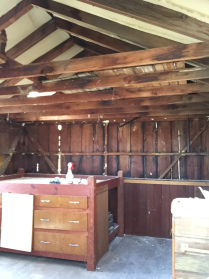 I didn’t take any “before” pictures: I was afraid that I’d never be able to sleep there if I had a reminder of how absolutely horrifying it was. I regret it now, because it would be nice to look back and see how much I’ve accomplished. The “before” pictures I do have were taken after I’d already filled a gigantic trash hopper with garbage and debris, ripped out all the drywall and insulation (which was even harder than it should have been, because I couldn’t see with my face mask steaming up my goggles), swept it clean, and scrubbed it several times with bleach. But I guess you can get an idea.
I didn’t take any “before” pictures: I was afraid that I’d never be able to sleep there if I had a reminder of how absolutely horrifying it was. I regret it now, because it would be nice to look back and see how much I’ve accomplished. The “before” pictures I do have were taken after I’d already filled a gigantic trash hopper with garbage and debris, ripped out all the drywall and insulation (which was even harder than it should have been, because I couldn’t see with my face mask steaming up my goggles), swept it clean, and scrubbed it several times with bleach. But I guess you can get an idea.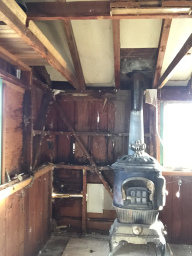
After I gutted it I put up new insulation, my mom helped me reroof it, put up new drywall and replace one of the windows (the original window had been stolen since I’d last lived there—don’t ask). I had to do dig out and repair the water line, do some minor plumbing on the indoor sink and replace the faucet.
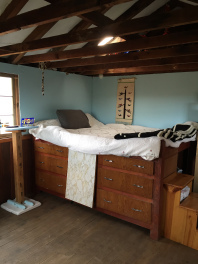 When the house was done, my mom helped me build a little bathroom next to it, using reclaimed wood she’d kept after doing some demo on the property. I set it up with a composting toilet, and a shower with a propane-fueled, in-line heating unit. I created a rudimentary greywater system for the indoor sink and the shower; they currently drain into the flower garden in front of my house. I have plans to expand or improve that system in the future.
When the house was done, my mom helped me build a little bathroom next to it, using reclaimed wood she’d kept after doing some demo on the property. I set it up with a composting toilet, and a shower with a propane-fueled, in-line heating unit. I created a rudimentary greywater system for the indoor sink and the shower; they currently drain into the flower garden in front of my house. I have plans to expand or improve that system in the future.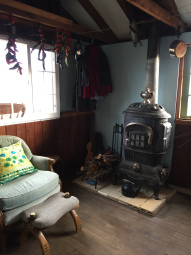
My mom really loves to do home-improvement stuff, and I loved working with her. It was kind of one of those “bonding” experiences people always talk about. Plus, it made me feel like she wasn’t just tolerating me, but actually liked me being there. Plus, I felt like she loved my tiny house almost as much as I did. She didn’t seem to think I was living in “a van down by the river” because I was too immature and lazy to get a real job and an apartment. She knew that I was choosing to live this way, and she seemed to understand why I would. And that felt good.
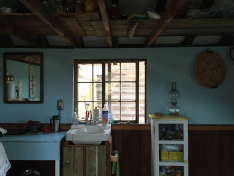 All told, the renovation and construction only cost about $1,500.00, including the toilet and shower…most of that money, in fact, went toward the toilet. I was able to do the job pretty cheaply, and to pay for it all out of savings.
All told, the renovation and construction only cost about $1,500.00, including the toilet and shower…most of that money, in fact, went toward the toilet. I was able to do the job pretty cheaply, and to pay for it all out of savings.
So, I moved into my tiny house and started my new life.
Next episode, I’ll talk about how I’ve set up my space, and how I think it might be better utilized. If you have questions about my experience with tiny house living, or if you have an issue you’d like me to address in my blog, I’d love to hear from you.


October 16, 2016
Why I Decided to Live in a Tiny House
It has been suggested to me that I blog about my experience living in a tiny house. I’m going to do that, not only because I’m having a lot of fun figuring out how to live this way, but also because I need to shift the focus of my blog for a while.
I currently live in an 11 x 14 cabin that I renovated myself, along with a 6 x 6 bathroom addition that I built mostly out of reclaimed wood. I live very cheaply, growing and preserving most of my own food. I’m not yet making perfect use of my space or my situation, but I enjoy the (constant) work in progress, and I’m having a lot of fun living this way.
This first blog post is going to detail how I came to live in a tiny house. My future blog posts will get into the nitty-gritty of my daily life: how I arrange and utilize my space; how I grow, process, and cook my food (this is mostly an excuse to take pictures of my beautiful canned goods and share my recipes); how I budget; and probably a bunch of other random stuff and off-topic tirades.
This isn’t the first time I’ve lived in a little house; in fact, it isn’t the first time I’ve lived in THIS house. Tiny house living is something I can honestly say I did before it was cool.
The year was 1998. I was finishing up my bachelor’s at The Evergreen State College in Olympia Washington, which is some sort of weirdo clown college where you can “design your own education”. This means you can write a “independent study” proposal saying you want to explore the possibility of cat telepathy. The college will undoubtedly approve this proposal, so then you can spend the whole quarter lying in bed staring at your cat, write a report on the experience, and the college will give you 16 credits as long as you pay your tuition. They don’t have to pay a professor, and you don’t have to listen to one. It’s a win-win.
So, anyway, I spent the last two quarters of my senior year doing one of those independent study contracts. I moved back to my hometown in Eastern Washington State and helped my mom start a small organic farming business.
My parents live on a beautiful ten-acre fruit orchard, which is where I grew up. It’s also where my dad grew up—my grandparents owned 40 acres back then, but sold off 30 of it. It’s been a working farm for way over a hundred years, so whenever you dig in the dirt or explore the rafters of the old outbuildings you find some pretty bomb-ass stuff, like those glass beads white people used to trade to the Native Americans; and boxes of 1950s porno, which is mostly just boobs.
One of the old outbuildings is a little eleven-by-fourteen cabin built in the ‘30’s by the Civilian Conservation Corps, which was one of the Depression-era programs started by FDR. When I moved back home for the farming gig, I decided I’d restore it and live there.
It was a cute cabin, made of indestructible redwood, but it had been used over the years as a chicken coop and skeevy teenager hangout and a bunch of other things that involved a lot of grodyness that I had to scrape out. It also had one of those old wood-burning stoves—the kind people used to actually cook and bake—which was awesome, but it was all rusted out and no longer fire-friendly, so I had to haul that heavy metal bitch out of there and into one of the outbuildings. Then, because there is EVERY THING IMAGINABLE somewhere on my parents’ property, I found another wood stove—a cast-iron potbelly—and hauled THAT heavy metal bitch INTO the cabin.
After that, though I’d never done anything of the sort before, I reroofed it, put in insulation, drywall, plumbing (a sink with cold water only), a skylight, etc. etc. My boyfriend’s dad built me a bed that sat about four feet off the ground and had a built-in dresser and storage underneath. It was really cool.
I lived there for a couple of years. It was peaceful and beautiful, and I loved it.
A bunch of yadda-yadda happens here. I moved out, started working as a paralegal (a job I hated desperately) got married about sixty billion times, and had a kid. I lived a lot of places, and owned a couple of houses that I really liked, but I always missed my cabin. Whenever I went back to my parents’ house to visit, I’d walk by there…but I’d never open the door. I hate moving, so when I moved out, I left it a wreck, with food still on the shelves and clothes and weird shit you don’t want to know about all over the place. The fact that I’d left my peaceful little house in that state really bugged me. In fact, I had frequently-recurring dreams about having to clean it out, except it always had more rooms than I’d remembered, and a labyrinthine basement full of mummies and evil rodents and rotten sandwiches, but I knew if I could just get it all cleaned up and in order my whole life would fall into place and be peaceful and beautiful like it had been before. (Though, let’s be honest, it never truly had been…but my cabin had been a safe place that made me feel it was.)
Even more yadda-yadda happens now, which I won’t rant about here, since I’ve spent about 906 blog posts rehashing it already. Long story short, my marriage fell apart in a blaze of glory. We had moved to California for his job, so when he served me divorce papers, I was in this weird place with like ZERO emotional resources to call upon. I mean that literally. I’m bipolar, and I was stressed out enough that I was not taking care of myself whatsoever. I was drinking almost every day, having psychotic episodes, and attempting suicide.
I didn’t know what to do with myself and my kid. All I knew is that I wanted to keep writing books. It was something I loved to do more than anything else, and something that helped me emotionally and psychologically. Plus, my husband had told me I wasn’t capable of making a living at it, and that I was wrong to want to write in the first place: that I was selfish and immature to have that dream.
I wouldn’t allow his spirit to rise up from the grave of our marriage and force me into a bitter, hopeless life working a job I hated and that I was ill-suited for. I didn’t want him to win. I wanted to be my own woman, on my own terms.
Of course, life never works out that neatly. I wasn’t able to spring triumphant from the ashes of my old life, valiant and stable and perfect. By the time my husband served me divorce papers, I had one book published, and a contract on two more, but I wasn’t making any sort of royalties. I had editing skills and was capable of setting up a freelance business to bring in some cash, but in order to make ends meet that way (at least at first) I’d have to live cheaply. Really cheaply.
I’m lucky enough to have extremely supportive parents with a beautiful 10-acre farm, and they were hinting pretty strongly that my psychotic, suicidal, rock-bottom ass needed to come back home like six months ago, along with their beautiful granddaughter.
I love my parents, and I love the farm, but I knew I couldn’t live long-term in their house. I’m a person who very much needs to have her own space. So, it was time to finally open the door of my old cabin and start mucking out the mummies and evil rodents and rotten sandwiches. It was time to finally get my life together.


October 11, 2016
LOVE OR MONEY is FREE TODAY!
Looking for a great romantic suspense to curl up with this autumn? Need a way to celebrate National Coming Out Day? Well, today you can download LOVE OR MONEY for FREE in Kindle format. Doesn’t cost a thing to check it out, and I’ll bet you’ll love it.


October 10, 2016
Mental Illness is Not Weakness
A few days ago while addressing a group of veterans, Donald Trump said that strong people can handle trauma without getting PTSD. In effect, he was stating that only the weak are susceptible to mental health issues after they experience trauma.
I myself suffer* from PTSD. My case arises not from wartime trauma, but from physical, mental, and sexual abuse. The idea that people with PTSD—and really, people with any mental health issue—are somehow too weak to deal with the fact that life sucks sometimes, and that we need to buck up, get over ourselves, and move on, is prevalent in society. In my case, it’s a belief that hinders my recovery.
I was diagnosed with PTSD about a decade back. At the time, I didn’t really know what the diagnosis meant. I thought PTSD was something ONLY combat veterans had, and thus I thought my doctor was joking. I’d never had to experience the horrors of dodging bombs and watching my buddies get blown apart. What kind of whiney bitch did my doctor think I was, that I would be as traumatized by my own experiences as a combat veteran would be by theirs?
I dismissed the diagnosis and refused treatment of any kind. I didn’t even investigate what PTSD was, or how it might affect my actions. I even went so far as to have that—and my other diagnosis of bipolar—removed from my medical records. I didn’t want to suffer the stigma. I didn’t want people to think I was weak or attention-seeking.
Then, a few years ago, I went through a period of very high stress in my life. The stress coincided with, or perhaps triggered, a severe manic episode, and I started writing obsessively and behaving a little oddly. My husband at the time became pretty snide about it. His behavior triggered something in me that sent me over the edge, I guess because it in some ways mirrored the behavior of a person from my past. He started to smell like this person, and sound like him. Whenever he would say something unkind to me, my emotions became uncontrollable: I’d get really, really angry, or hurt, or hysterical. I began avoiding him, disappearing for weeks on road trips.
The situation became a sort of feedback loop: the more emotional and erratic I became, the more critical my husband became of me. He told me I was an immature loser and that he was done with me, and kicked me out of the house on a couple occasions. For my part, I was drinking heavily and, eventually, cheating on him.
I wanted to either act “right”, or leave, but I literally couldn’t bring myself to do either. I was terrified to be alone, yet incapable of pulling myself together the way my husband wanted me to. I would watch myself do incredibly self-destructive things and be absolutely powerless to stop.
It’s hard for me to say that: absolutely powerless to stop. After all, lack of self-control is the ultimate weakness. I told myself, day in and day out, that my marriage and my life were in shambles because I was too weak to fix them. If I’d had any control over my emotions and behavior, I would have been able to make my husband love me again.
I was already in a severe depressive episode when my husband finally served me with divorce papers, on the day after Valentine’s Day. I had a suicide attempt (a fairly halfhearted one, since the means at hand were poor), and finally ended up in a mental health crisis center where they said, no really, you have PTSD and bipolar disorder, and we’re going to help you with them.
I’d never been able to stay on medication before. I thought the whole point of pills was to dull your brain and render you inert, so you wouldn’t cause problems for yourself or those around you. I thought they’d kill my creativity and prevent me from going manic; that I’d never have fun or feel any real feelings anymore. After all, pills couldn’t fix what was wrong with me, because they couldn’t cure weakness or repair personality flaws.
But I stuck with treatment this time, because I was tired of my life being unstable, and I had a kid to stay alive for. I didn’t know what else to do. I had to try something.
After trying a lot of different horrible meds, I was finally put on a combination that didn’t make me feel like a disjointed, sleepy puppet from the dream dimensions. It actually made me feel better.
The first time I realized they were working correctly was when I got into a very stressful situation. I’d been in the same situation before, when I was unmedicated, and I’d reacted very badly. My anxiety, self-loathing, and other distress had swelled up in me until I couldn’t see; the only thing left in me were those feelings, and so they were all I had that could inform my actions. When you feel like that, you can’t behave in healthy ways. You want to destroy yourself so that you don’t feel like that anymore. However, with the medication, I was in control, and not my emotions. I was still upset, yes, but my feelings didn’t send me skidding into the walls off-kilter.
That’s when I realized I’d never actually lacked self-control. My brain just worked differently than most people’s, and pretty much anyone would have acted the same way if they’d felt like I had when I’d done those self-destructive things. This was probably the most amazing self-realization of my life.
Some people might still think I’m weak—Donald Trump maybe would think he’d be able to go through what I’ve gone through, and still be his pompous, egotistical self. And maybe I am more susceptible to PTSD than others, because of my bipolar or for some other reason. I don’t know.
I was in the supermarket once and saw a young woman with no arms, using her bare feet to grab cups of yogurt from the cooler and put them in her cart. I tried not to stare, but it was pretty amazing to me. I’m sure it wasn’t amazing to her, though: it was just what she had to do, because she had no arms. No one with any scrap of insight would call that woman weak. I would even make the claim that nothing was wrong with her whatsoever. If she broke her ankle, it would probably affect her life more than it would someone who had arms, but that still doesn’t mean she’s weak. She’d just have to cope in different ways.
Those of us with neurodiversity and mental illness are not weak. We just have to learn to cope differently than other people. I actually think that my experiences have given me more self-knowledge, depth of character, compassion, and insight into the human condition than someone like Donald Trump will ever have. And that isn’t a disability: it’s a beautiful thing.
*I use the word “suffer” intentionally here. I would not use this word with any other sort of neurodiversity (and whether PTSD is truly a neurodiversity, I will leave others to argue, because I think each individual can choose for themselves how they want to identify). However, PTSD is unlike bipolar, ASD, schizophrenia, and other diagnoses that are an organic part of the brain. PTSD is caused by trauma, is preventable and, unlike those other diagnoses, has no component to it that I would call desirable (and yes, I think that neurodiversity can be a good thing, though there are some struggles that definitely go along with it).
Elizabeth Roderick is an author. Many of her books deal with neurodiversity and abuse issues.


October 7, 2016
Nightmare on Query Street
I’m finally dropping by again to mention I’m going to be a mentor in the awesome Nightmare on Query Street contest. If you haven’t heard of it, it’s a great way to get your query and first 250 words polished and in front of a slew of great agents. It’s for a wide range of genres: the only things not accepted are picture books and erotica. Check it out! http://www.michelle4laughs.com/2016/10/mentors-for-nightmare-on-query-street.html


August 22, 2016
*COVER REVEAL* Piecing Together Sydney
Coming August 30th from Fatebound Publishing
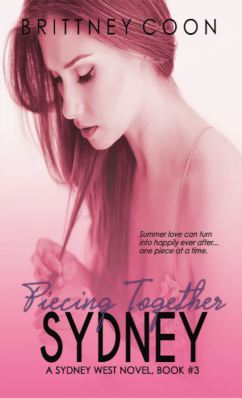
PIECING TOGETHER SYDNEY by Brittney Coon
A Sydney West Novel, Book 3
Cover Designer: Rock Your World Designs
–– SYNOPSIS ––
Sydney West is no longer a party girl looking for summer boys to occupy her nights. She has found love with Jason King and agreed to marry him. With wedding plans in full swing for the July deadline, everything seems to be perfect.
When Jason turns cold and distant, the party scene beckons Sydney to return to her old drink-all-night ways. Only this time the guys at the bar don’t hold her attention, but when Sydney’s drink is drugged by a so-called friend—she kisses one of them. When Jason finds out, he leaves the beach house to clear his head, but a couple hours quickly turn into days.
This summer is nothing like what Sydney had planned, and for the first time she’s afraid of the future. Sydney finally figured out what she wants and she isn’t willing to let Jason go without a fight. But is it already too late? Sydney will risk everything to…
Brittney Coon graduated Magna Cum Laude from Arizona State University with a Bachelor of Science in Communication and a minor in Film and Media Production. Brittney has always been creative and turned to writing to share the stories playing through her head. In her spare time she reads, watches Friends
–– FOLLOW BRITTNEY ––
Blog Tour: Timeless hope
A collection of Romantic and Inspirational short stories that will reach into your soul and deeply into your heart. Walk with the characters and see what they have to say.
Little Red Shoes…a young widowed mother who has an angel for a six year old daughter. Her father, who was killed in Iraq talks to her in her dreams and stays connected with her. A day comes when she sees an opportunity to do something good and she doesn’t pass it up.
A Fireside Request…a love story about an older man and woman who live in a retirement community. Both are alone and both are in love, but neither has had the courage to tell the other. Read what happens as love arrives again when you think you may be too old for it.
The Miracle…a touching story of hope and faith during a mans struggle with what life has thrown at him. He’s given an opportunity when he doesn’t even realize it. Does he make the right choice and what happens when he chooses. Take a moment and see what unfolds when a Higher Power steps in.
A Petal from a Rose…Can a dream really become a reality? When Steven dreams every single night of the woman he has always hoped for he thinks he is losing his mind. When she begins to leave him something on his pillow he’s almost convinced until something unimaginable happens.
Butterfly…a young woman struggles with pain and loss and lives within personal boundaries that hold her down. Can she overcome the pain, transform and find her true meaning in life?
Find Timeless Hope HERE.


August 18, 2016
Sign Up to Receive a Free Anthology of Great Short Stories!
Not only is it a great idea to sign up for my newsletter in general – you’ll get news about my books, signings, and giveaways. You’ll also get access to free content such as short stories and excerpts. And now, FOR A LIMITED TIME, if you sign up for my newsletter you’ll also get an AWESOME free anthology from an excellent group of “Strange Authors”. My submission is a Tinkerbell Into the Darkness story that wasn’t released to the general public before.
Sign up here!
Subscribe to our mailing list
* indicates required
Email Address *
First Name
Last Name


August 9, 2016
Son of a Pitch is Coming!
Hello, everyone! It’s almost that time again! I had so much fun being a critiquer/judge in the Son of a Pitch contest last time, and I can’t wait to participate again!
For those of you not familiar with Son of a Pitch, it’s a critique-based contest that allows entrants to get feedback on their query and first 250 words from published authors as well as from other writers. It’s a great way to hone your pitch and first page, and hopefully get them in front of agents and editors! More info is here.
This go-round we have a theme: Disney heroes and villains. I have chosen to be Ursula from The Little Mermaid. I know you want to be on my team because it’s the best one: Ursula kicks butt with her dark ocean-magic.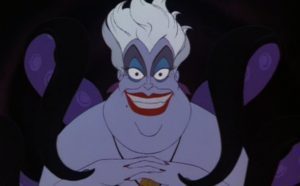
A little about myself: my name is Elizabeth Roderick. I’m the author of Love or Money, a standalone LGBT romantic suspense novel (published through Limitless Publishing), and The Other Place Series, a new adult magical realism series (also through Limitless; the first two installments (The Hustle and The Other Place) are already out, and the last two will come out next year). I have several other books in various stages of editing, and am working on a few more. I write YA, NA, and Adult, and my genres range from contemporary to fantasy and all points beyond and in between. My books usually feature characters of the sort society tends to shun (addicts, convicts, the homeless, and the neurodiverse). I think if you get to know my characters, as well as people like them in real life, you might find they’re a lot more wonderful and interesting than you originally thought.
Part of the reason I write “unlikeable” characters that is because I myself am a neurodiverse person, along with all the baggage that can come with that (I’m a recovering addict, for instance). I’ve recently “come out” about the fact that I have bipolar disorder with episodes of psychosis. This profession is one of the few where this might actually be an asset: my experiences I think lend a lot of insight to my writing and my characters. A lot of things people only know about from television, I’ve lived through, for better or worse. Believe it or not, it’s not all dark!
I use my stories as a way to explore the different ways in which people’s minds work, and the many ways in which they learn to live and love in this crazy world. It’s my strange and convoluted way of trying to find out how I fit into this society. I think a lot of writers write for the same or similar reasons.
Enough about me. I’m really excited to be part of Son of a Pitch again. I love reading everyone’s entries. The only problem is I’m always left wanting to read the entire manuscript.
Critique contests like these are so important. I would never have gotten published if it weren’t for the advice I got from other writers, authors, and industry professionals along the way. Writing is a subjective business, and we all know that sometimes the advice we get from critiquers can be contradictory. But it is always a learning experience. It’s sometimes difficult to see how our stories will be perceived by others. Readers won’t always walk away with the same perceptions, but knowing what those perceptions are gives us incredible insight into our own work, and helps us to make it stronger, even if we end up not taking the exact advice our critiquers gave us.
The support of other writers and professionals in the community is also incredibly important. My hope is to see each and every entrant published. My first job in that regard is to make sure that no one gives up. The only thing that separates writers from authors is the refusal to throw in the towel, even when it gets hard. There will always be days when you think you can’t go on, when you’re angry, when you’re sure you “suck”. Ask anyone who is published, even people who are mega-famous bestsellers. They’ve felt the same way. I want you all to love writing, and to believe in your own voice, enough that you’ll never give up.
As for what kind of stories will be my favorites, I’m constantly surprised by what I like best. Any of you who know me know that I am a huge fan of diverse stories, especially #ownvoices. That isn’t limited to stories about and by neurodiverse people—I’m massively excited to see stories from authentic points of view that I’ve never read about before. In fact, I would be so honored if you would comment on this blog post, or in a private message if you prefer, and tell me the inspiration for your diverse and/or #ownvoices story. I love hearing people’s personal stories as much as I like reading their fiction.
That said, I’m a huge fan of any sort of story that’s well-told, even if it can’t possibly be #ownvoices because it’s about a being that is a near-sentient wisp of memory contained in the scent of jasmine in a young woman’s garden. (That one sounds like a tweet from Magical Realism Bot.) I love crazy stories, and more traditional stories; quiet stories and high-action stories; stories about love and hate and everything in between. I want to read them all, and I can’t wait to!





